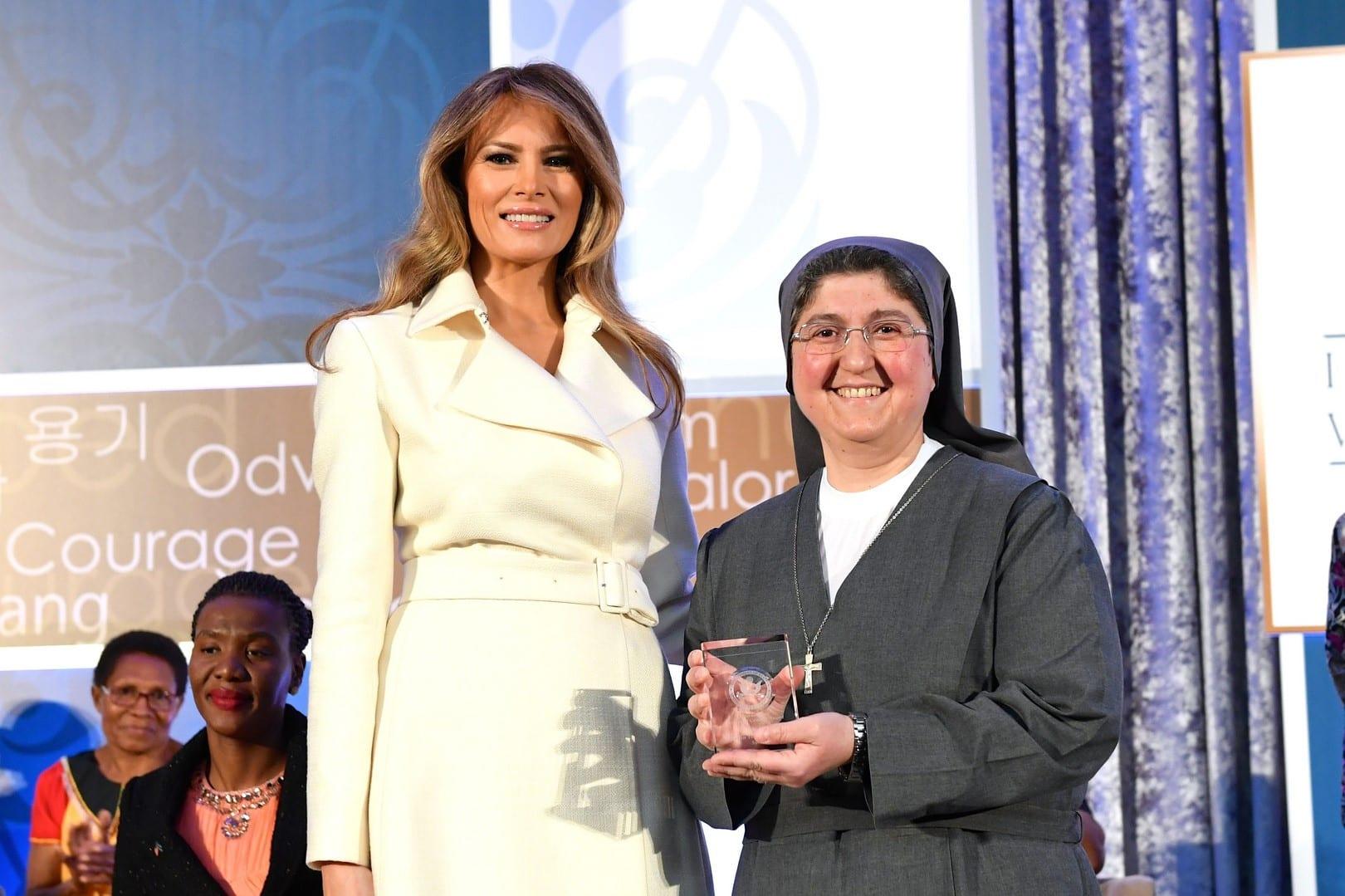ROME – As G7 nations work to isolate Syrian President Bashar al-Assad, and possibly prepare the ground for military action against him, a Salesian sister recently honored as a “Woman of Courage” by the U.S. State Department is swimming against the tide.
Sister Carolin Tahhan Fachakh of the Salesian Daughters of Mary Help of Christians, who runs a nursery school in Damascus, Syria, told reporters Tuesday that she “likes” the Syrian strongman, and that he’s been very helpful and protective of Christians in the country.
Tahhan received the “International Woman of Courage Award” from the first lady Melania Trump on March 29 in Washington. She was nominated to receive it by the U.S. embassy to the Vatican, and spoke at an event sponsored by the embassy on Tuesday.
Tahhan also said she believes there’s no truth to the reports that it was al-Assad who used Sarin gas to target a civilian population last week, an allegation which prompted the Trump administration to bomb a military base in Syria.
The 13 winners of the award had been decided under the Obama administration, but held up until Rex Tillerson, current Secretary of State, approved them.
Tahhan described Trump’s decision to bomb the Shayrat Air Base, the alleged source of the chemical attack, as “a step back from peace.”
“Every time we say there is hope for peace, let’s move forward, something happens to set us back. The situation is ugly now,” Tahhan said, referring to Trump’s decision to bomb government military installations.
Yet she still harbors hope for peace, because at one point or the other, “everything ends.”
RELATED: Syrian bishops, other Catholic leaders protest U.S. missile strike
Tahhan also said that she doubts al-Assad launched the chemical weapon attack in April because he knew the eyes of the world were on him and Syria, and that the threat of the U.S. or another country bombing as a response was real.
The sister regretted the fact that Syrian children are being raised in a “culture of war,” capable of distinguishing from their sound the difference between a cannon shot or a missile.
She told the following story: “One morning [at school], I felt a buff. And I asked a teacher, ‘What is that?’ A four-year-old boy told me it was a cannon. I asked him, ‘how do you know it’s a cannon and not a missile?’ And he said: ‘Because, sister, when the missile is fired, it does ssss buff, while the cannon does buff.’”
Tahhan felt bad that morning, because this, she said, is the culture in which children in Syria are coming of age.
“What do we do in the future? How do we take this violence out of the heart of our children?”
The nun also said that children in Syria have all been “damaged by the war, they are afraid,” with some of them no longer speaking.
Therefore, together with other Franciscan sisters who run the school, they try to offer them a climate of peace and serenity, “where every child who is in need can play in the big courtyard and study.”
Asked about the international perception of al-Assad being a “monster” or a dictator, she responded: “I like our president. He’s very close to us, as is the first lady. They’re very close to the Church. Speak easily, call him a dictator, but to me, he’s not. We’re at ease.”
Regarding a possibility of Syria achieving peace without the president, as the G7 seems committed to doing, Tahhan said she didn’t know what that “would look like.”
The group, which includes the United States, Germany, France, the United Kingdom, Italy, Japan and Canada, met on Tuesday with its allies in the Middle East, including Saudi Arabia and Turkey, to try to isolate al-Assad, and agree on sanctions against his biggest supporter, Russia.
Tahhan’s position is in line with that of other Christian leaders in the region. None of them would say he’s an angel, but most prefer al-Assad to the alternatives, one of which could be ISIS.
“If we have to choose between ISIS and Assad, we choose Assad,” said Greek Catholic Melkite Archbishop Jean-Clement Jeanbart of Aleppo. “It seems sometimes all the countries of the world are against Assad, but we feel we don’t have any other alternative. Honest to God, this is the situation.
“I’ve met Assad a couple of times and all my colleagues, my fellow bishops and the priests and nuns, appreciate him,” Jeanbart said, talking to Crux in 2015. “But that doesn’t mean he’s an angel.”
RELATED: Are Francis and Trump now at odds over Syria too?
Tahhan is not only defiantly against the portrait of al-Assad given in the West. She also challenges the perception that Muslims and Christians cannot coexist peacefully in Syria, saying that to this day, six years into the war, most still get along.
The problem, she said, is terrorism, not Islam.
Beyond the school for children, the Salesians in Baghdad also run a school to train women in sewing and tailoring. In the past 7 years, more than 500 woman have attended class.
“The majority are Muslims. If I said we would only choose Christians, then I would become a fanatic myself,” Tahhan said.
“When a missile falls or there’s an explosion,” she continued, “many Muslims knock on our door and ask, ‘Sister, are you OK? Do you need anything?'”
Furthermore, Tahhan said at different points in the conversation, children see no difference between the two communities: “But they do feel the war, without a doubt.”
In recent years, many Christian leaders have raised their voices in warning, saying that if the war in Syria and Iraq continues, with extremist organizations such as ISIS continuously threatening the minority populations committing genocide, the presence of Christians in the Middle East is at risk.
Yet Tahhan is more hopeful: “The Church is working to preserve Christians. While the Church continues to exist, Christians will continue to have a presence.”














